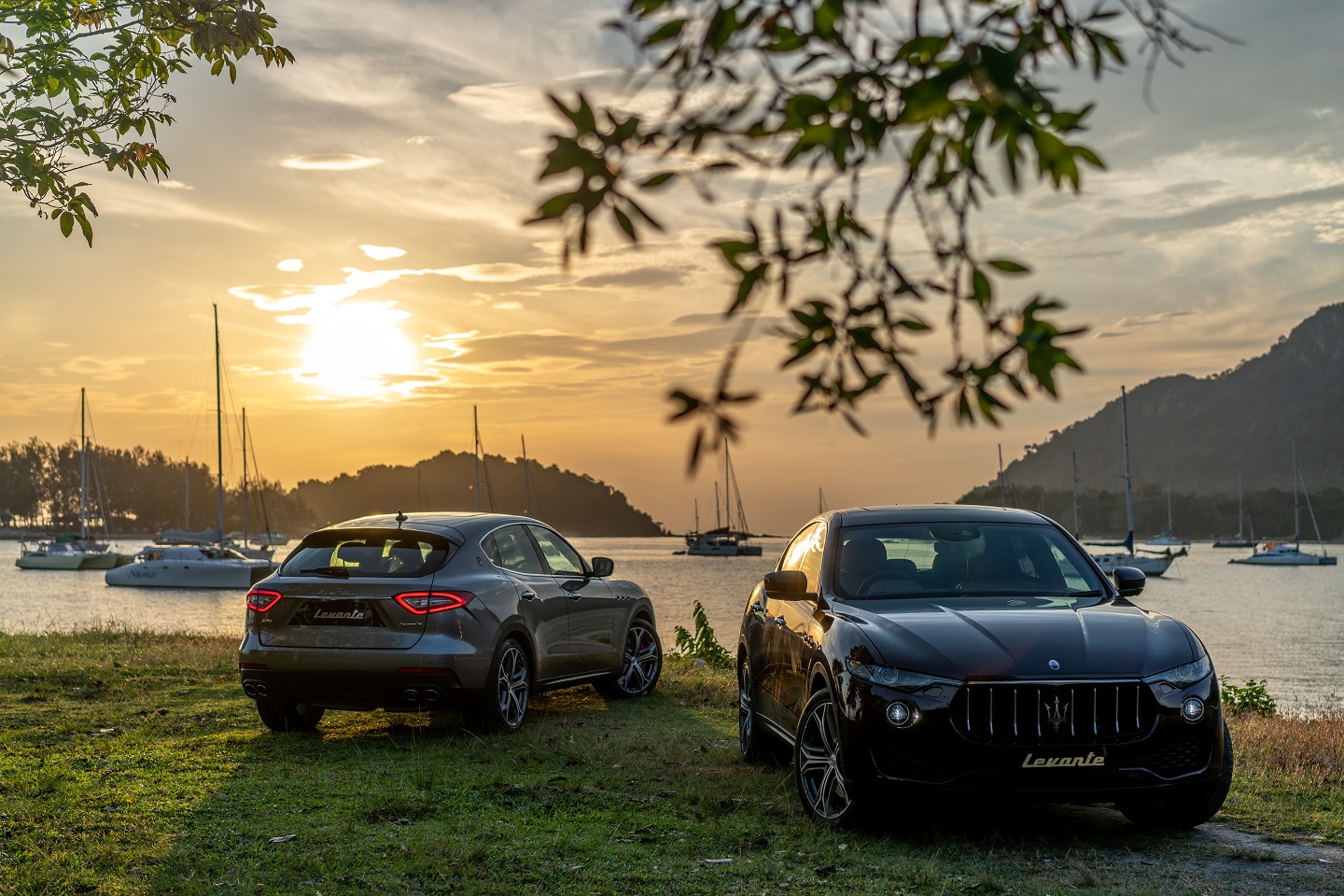
The Maserati Levante S sports a wide-gapped grin of a grille inspired by both the trendy Alfieri and the historic Tipo 60 Birdcage (Photo: Maserati)
Automotive purists might be horrified that the virile symbol of midlife crises has met the soccer mom mobile, but the recent trend of sporty luxury marques crossing over into SUV territory does not necessarily warrant the laments of doomsayers. Sure, sleek hot rods and the all-terrain, four-door beasts seem the antithesis of each other, hence traditionalists would rather sporty automakers stay in their lane, so to speak. Will upsizing dilute a speedster’s brand? We took the Maserati Levante S and the Ferrari GTC4Lusso T out for a spin to see if we liked where this was going.
Maserati christens its cars after the world’s most famous winds. Levante draws its moniker from the easterly wind that traverses through the western Mediterranean Sea and southern France. Its dual nature is harnessed in this model — powerful under the hood and in structure, with better control over the gale-like force of this temperate stallion. Its design language reflects power and control as well as the marque’s signature flair, of imposing form sketched in coupé lines and pronounced haunches. Fronting the elongated bonnet is a wide-gapped grin of a grille inspired by both the trendy Alfieri and the historic Tipo 60 Birdcage, evidence that real style never goes out of fashion.
Customers can opt for the luxury-oriented GranLusso or zippy GranSport trims. The former elevates the baseline V6 exterior with elegant chrome inserts in the front fascia, chrome skid plates, silver-painted brake calipers and GranLusso badges on the fenders. The latter boasts distinguishably sportier bumpers, in addition to Black Piano inserts, red brake calipers and relevant badges on the front fenders.
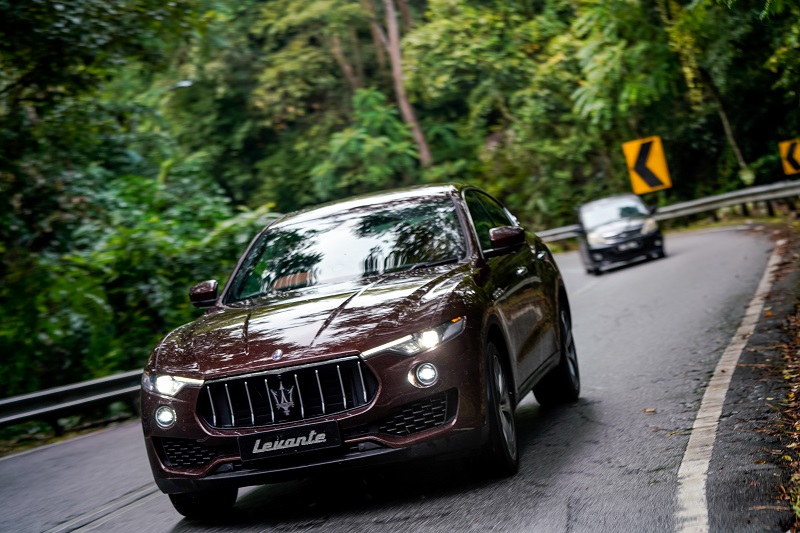
I was dubious about putting the Levante S through its paces in Langkawi but quickly realised the genius of the location: the island’s numerous single lanes and worn, winding roads are an ideal playground to test the agility and handling of a bulky, high-powered SUV. At 5m long and almost 2m wide, it occupies most of its lane on the single-carriage roads, which left little room for passing vehicles.
Accustomed to sedans, I was not used to manoeuvring a vehicle of this size, but the Levante S is sensitive to the slightest cues. Overtaking is a skill of keen timing and spatial awareness, and its practice always reminds me of terrifying rides to Sungai Buloh in the 1990s, along trunk roads dominated by aggressive lorry drivers. The hairy game of ready, set, speed up and cut in is infinitely more fun in a car this eager.
Switching off the lane-keeping assist was necessary and easy, with the intuitive infotainment display. The safety feature is unforgiving and quick to pull the steering wheel whenever a lane divider is in danger of being breached. Kudos to the system for its hyper-vigilance, though counterintuitive in this scenario.
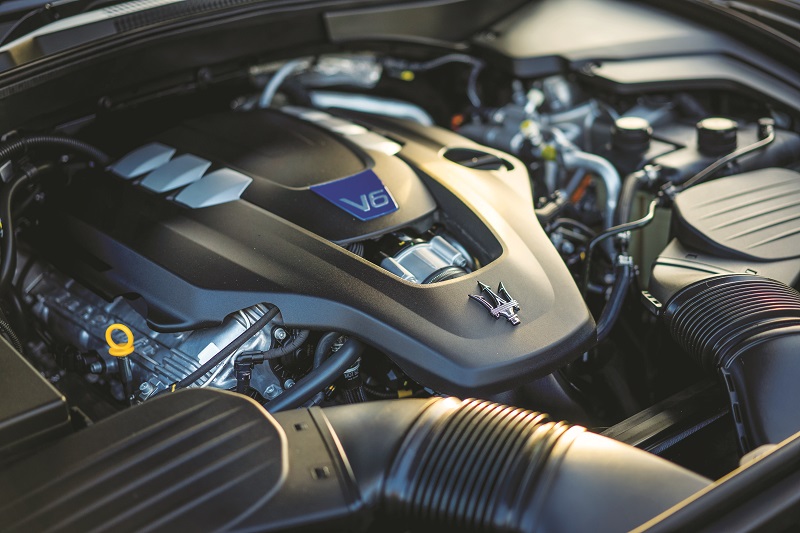
Oncoming traffic was clear and with sufficient space between the cars in front, I eased to the right, pulled ahead and glided back into the left lane. With a 0 to 100kph acceleration of 5.2 seconds and a top speed of 264kph — the three-litre twin turbo V6 engine’s torque of 194nm per litre is the best of its class — this delicate act felt like child’s play. Its quick response and the fluidity of acceleration and braking transitions delivered such reassurance in handling that I repeated the routine almost unthinkingly, trusting the lithe beauty to respond on command.
While fun to drive, the Levante S promises a cushy ride for passengers, with its Q4 all-wheel drive system and superior suspension. The cockpit-like interior intimately wraps around the front seats, much like a cabin, that I almost forgot the sheer size of its exterior. Claustrophobia is staved off with frameless doors and limited sunroof bezels that subtly increase one’s sense of space.
The back half of the cabin invites repose, particularly in the GranLusso trim with upholstery options of full Italian leather, Pieno Fiore natural leather or Ermenegildo Zegna silk. It is roomier here and, along with the deep trunk, was conceptualised with lengthy road trips or athletic pursuits in mind — to banish cranky children to separate corners and revel in never playing Tetris with luggage or wrestling in golf bags again.
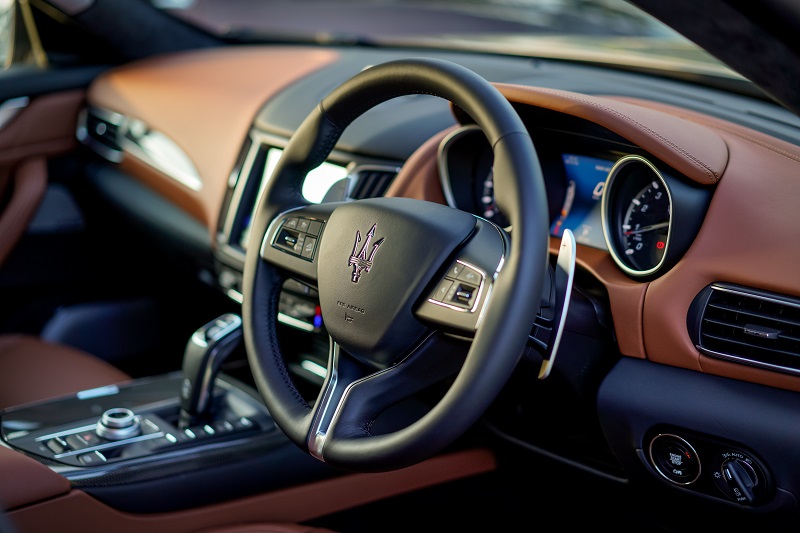
Bowers and Wilkins worked through a playlist intended for a sun-drenched day in tropical paradise, the immersive surround sound setting the mood without interference from road noise. We finally hit an open road whose paving was not baptised with dust and its dual lanes begged for a leap in pace. The eight-speed ZF automatic transmission obliged and I rewarded its enthusiasm by shifting into manual and turning on Sport mode on the redesigned centre console.
This mode is the soul of a sports car, the realising of its potential that is best expressed with a roar. We associate that rumble and reverberation with power, and later, in the hands of my co-driver, the locals would have been forgiven for thinking an ornery tiger had wandered into town. I chose to maintain the RPM at a growl for the most part.
The rich timber, like the pleased purr of a big cat, was an underlying soundtrack throughout the rest of the drive, in between playing with the smooth Skyhook suspension (the rise and release is almost imperceptible) and complimenting the reliable navigation with thankfully updated maps. Illuminated doorsills showed me out of the car at our destination and the Soft Close Doors system pulled the door shut silently behind me.
While we had the Levante S at our disposal for an entire afternoon, my encounter with the Ferrari GTC4Lusso T was closer to speed-dating. There was no need for fumbling small talk or feigned interest here though: This was like turning up at the event and meeting Kit Harington (to each their own).
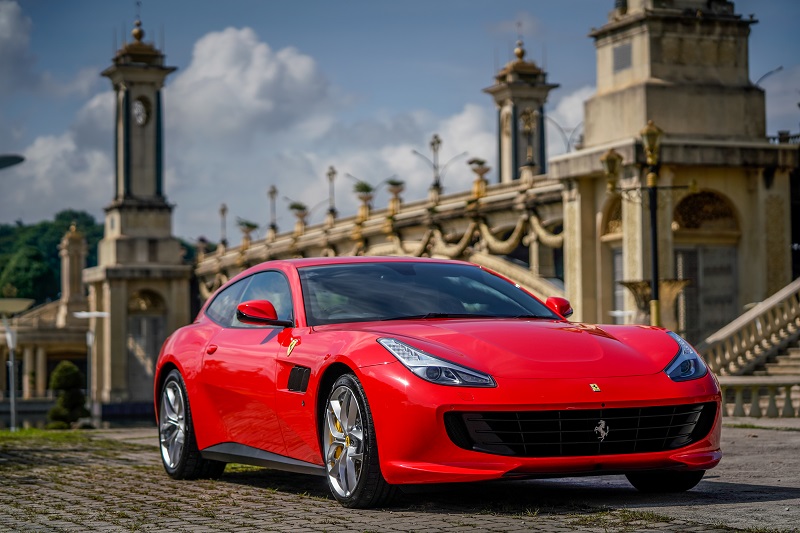
Where the Levante S had deferred slightly to its SUV status in stature, Ferrari prioritised its athleticism in architecture. Streamlined, sitting low and tapered with an almost fastback-like silhouette, the GTC4Lusso T emphasises its racing heritage inside and out. A dual cockpit concept allows the front passenger to share in the driving experience with a digital display of RPM, speed, gear and G-force.
The marque’s first four-seater to be powered by a V8 engine — from the same family that won the 2016 International Engine of the Year — features a rear-wheel drive with modified dynamics for keener handling. Excess weight has been sculpted off with increased weight bias towards the rear, and the 4WS rear-wheel steering facilitates sharper response to steering wheel inputs. The Side Slip Control 3.0 system adapts behaviour to suit changing dynamic and grip conditions, exerting superlative control when taking corners at not insignificant speeds or hurtling across varying road conditions.
In Kuala Lumpur, that typically means the occasional pothole or shoddy roadwork. I was apprehensive about being responsible for a car that costs more than the average house, but Ferrari knows what it is doing. Just sitting in the driver’s seat inspired confidence. The cockpit has an assuring solidity about it and the no-nonsense set-up suggests the automaker would like you to stop fussing and just get on with driving.
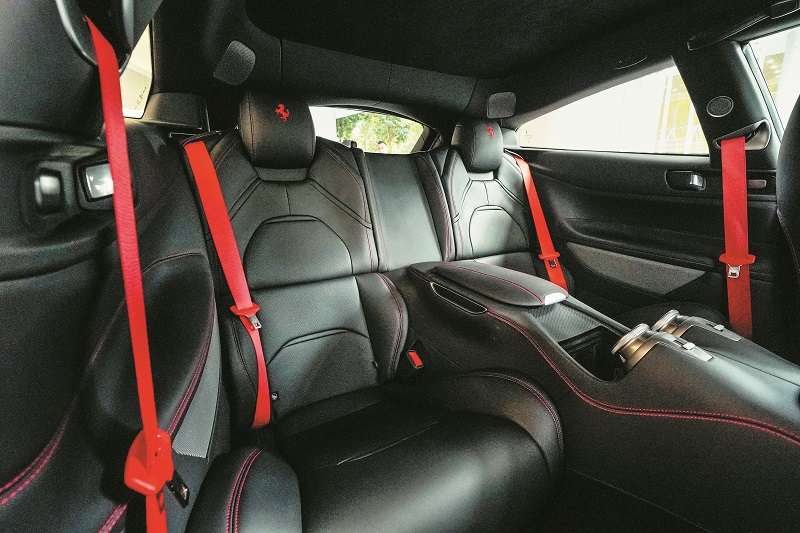
Most controls are built into the steering wheel itself and the central console is consequently minimalist. We pulled out of the driveway before the showroom and headed for Putrajaya and within minutes, I was a convert. Handling was consistently silky but steady. I put the pedal to the metal — it is a Ferrari, after all — but the acceleration was indiscernible as I settled back into the artisanal hide of the seat and enjoyed the scenery whipping by.
We inevitably hit a traffic snarl and I reined in the prancing horse. We crawled into a tunnel and the possibility of heightened acoustics necessitated exprimental revving. It seemed ridiculous to make that much noise while going nowhere fast but some of us don’t drive a Ferrari every day. I gave the throaty engine a full throttle and it did not disappoint, resounding through the tunnel and no doubt provoking eye-rolls from annoyed drivers.
I had maybe half an hour behind the wheel but that was sufficient for a taste of the beast. It ticks the basic criteria of a practical SUV: adequate legroom in the back, decent boot space and commendable fuel efficiency. It seems an oxymoron to say, but this is the Ferrari I would want for daily driving.
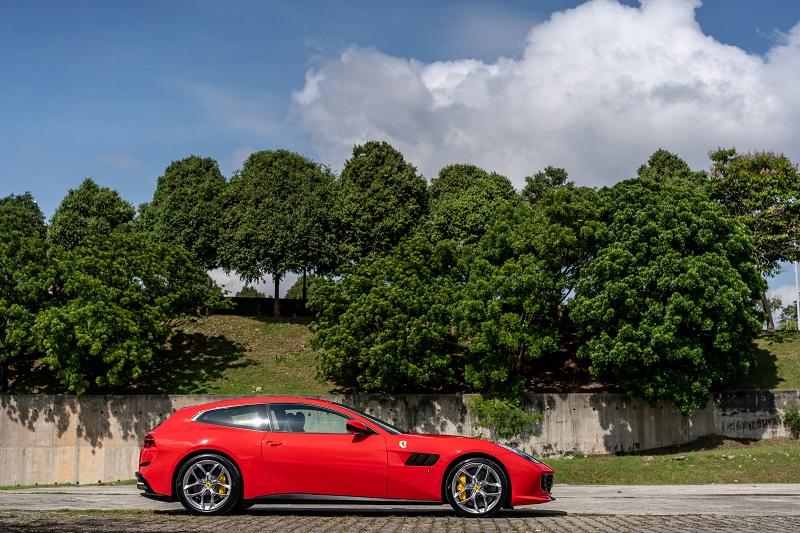
Maybe that is what the naysayers refuse to accept. Driving a sports car is an occasion in itself as it zips down the road and weaves through traffic, attracting irritated or covetous stares. And while some SUVs are undeniably sexy, its size and image do not quite match up to the carefree, life in the fast lane impression of a sleek, hot-blooded ride. Perhaps the question to ask is not why, but why not.
If you are shelling out six or seven-figures for a car, it makes sense to have one you can drive everywhere from work or the grocers to family vacations out-of-state. It is not a compromise, but possibly a solution that marries the best of both worlds. And if you are going down the luxury SUV road, you cannot go wrong with an Italian job.
The Maserati Levante S MY19 has a starting price of RM788,800 (inclusive of local taxes and duties) while the Ferrari GTC4Lusso T has a base price for RM1.078 million (excluding tax and duties). This article first appeared on Feb 18 in The Edge Malaysia.


